| Srl | Item |
| 1 |
ID:
109041
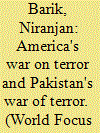

|
|
|
| 2 |
ID:
096333
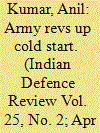

|
|
|
| 3 |
ID:
086672
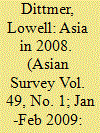

|
|
|
|
|
| Publication |
2009.
|
| Summary/Abstract |
In Asia as around the world, 2008 was a challenging year. On the one hand, it teemed with disasters, both man-made and natural, amid growing apprehension as the shock-waves of the American financial tsunami ricocheted throughout the region. On the other, guarded houe for renewal was inspired (for some) by the arrival of new political leadership.
|
|
|
|
|
|
|
|
|
|
|
|
|
|
|
|
| 4 |
ID:
189067
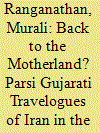

|
|
|
|
|
| Summary/Abstract |
The publication of four Gujarati travelogues written by Parsis traveling to Iran in quick succession in the 1920s marked the intensification of a relationship that had hitherto been based mainly on philanthropy directed towards the Zoroastrians of Iran. The Pahlavi regime, with its assurances of religious tolerance and equity, prompted Parsis to consider deepening their connection with Iran through trade and business investments and also examine the possibility of return to their motherland. The encounters which constitute these travelogues could be framed as experiments which helped the Parsi community in India to construct a framework for developing this relationship. The Parsi travelogues, while attempting to recover a Zoroastrian past in Iran, also try to map the future for the community by addressing its present anxieties and aspirations.
|
|
|
|
|
|
|
|
|
|
|
|
|
|
|
|
| 5 |
ID:
102314
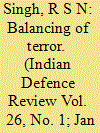

|
|
|
| 6 |
ID:
114510


|
|
|
|
|
| Publication |
New Delhi, Penguin Books India Pvt.Ltd, 2012.
|
| Description |
xxii, 254p.Hbk
|
| Standard Number |
9780670086092
|
|
|
|
|
|
|
|
|
|
|
|
Copies: C:1/I:0,R:0,Q:0
Circulation
| Accession# | Call# | Current Location | Status | Policy | Location |
| 056749 | 305.56909547923/BOO 056749 | Main | On Shelf | General | |
|
|
|
|
| 7 |
ID:
100685
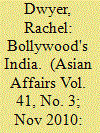

|
|
|
|
|
| Publication |
2010.
|
| Summary/Abstract |
This article propounds the thesis that Bollywood cinema, the modern Indian cinema based in Mumbai (Bombay) is a better guide to the realities of modern India than other, more scholarly works. The author, who distinguishes and describes a number of different types of Bollywood film, suggests that these films are an unparalleled guide to the thoughts, aspirations and attitudes of the hundreds of millions of members of the emergent middle classes. For example, their view of history is purveyed by the cinema, not by books written by academic historians; their attitudes to politics are formed by films, not by the speeches given by politicians.
|
|
|
|
|
|
|
|
|
|
|
|
|
|
|
|
| 8 |
ID:
122091
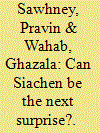

|
|
|
| 9 |
ID:
121104
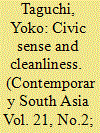

|
|
|
|
|
| Publication |
2013.
|
| Summary/Abstract |
A new type of civil society movement led by the urban middle class has grown with increasing economic liberalization, one that aims to eliminate 'filth', including garbage, slums, and street stalls, from the city's public space and to create a 'world-class' city. These movements have been critically analyzed as a phenomenon representing a new India aspiring to progress based on consumerism and pleasure at the cost of the poor. 'Fight the Filth', organized by a Mumbai English-language tabloid, is one campaign of this type. This paper aims to provide a new perspective to understand these controversial movements by focusing on the forms and aesthetics of this campaign. It illustrates the demands on the middle class in public culture, both to catch up with global India's new consumer aesthetics and to be proper citizens responsible for the society at large, and considers how the middle class is coping with this.
|
|
|
|
|
|
|
|
|
|
|
|
|
|
|
|
| 10 |
ID:
104718
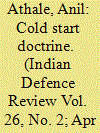

|
|
|
| 11 |
ID:
021927
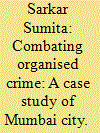

|
|
|
|
|
| Publication |
May 2002.
|
| Description |
133-176
|
|
|
|
|
|
|
|
|
|
|
|
|
|
|
|
| 12 |
ID:
165939
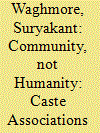

|
|
|
|
|
| Summary/Abstract |
This paper explores the nature of urbanism that caste associations seek to construct in the metropolis of Mumbai. To this end it asks: what role do caste associations play in the cosmopolitanism(s) of Mumbai? How do they help individuals negotiate cosmopolitan urbanism? What is the nature of the civility and public-ness they aspire to and work towards? What are the challenges they face? I suggest that caste associations of the ‘pure’ and ‘privileged’ work towards achieving an ideal of Hindu cosmopolitanism. Such associations may seem to be ‘bad’ cases of cosmopolitanism because they achieve a certain kind of limited openness and tolerance while continuing caste closure. However, they attempt to provide cultural roots to consumerist individuals in the urban environment. The challenges facing caste associations point both to the limits of urban Hindu cosmopolitanism as an ideal and social practice and to the lack of alterity as a necessary moral value for Hindu cosmopolitanism.
|
|
|
|
|
|
|
|
|
|
|
|
|
|
|
|
| 13 |
ID:
117599
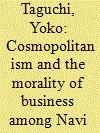

|
|
|
|
|
| Publication |
2012.
|
| Summary/Abstract |
Based on anthropological fieldwork, this article confirms that arguments about the decline of Mumbai's cosmopolitanism through the rise of regionalism and hindutva have failed to consider the idea of 'cosmopolitanism' as understood and used by local people, specifically local merchants. Reconsideration of cosmopolitanism in relation to regionalism focuses on the morality of business, as expressed by merchants in Navi Mumbai, is examined through two case scenarios. The Marathisation of signboards led by the Maharashtra Navnirman Sena (MNS) and participation in the Ganesh Festival show that their morality of business enables Navi Mumbai's merchants to adjust to various kinds of challenging phenomena, including those seen as regionalism. The same business morality, then, skillfully re-constructs the foundations of cosmopolitanism as a polyphonic folk term.
|
|
|
|
|
|
|
|
|
|
|
|
|
|
|
|
| 14 |
ID:
098515
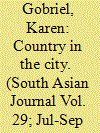

|
|
|
| 15 |
ID:
106890
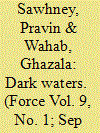

|
|
|
| 16 |
ID:
098074
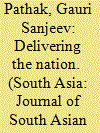

|
|
|
|
|
| Publication |
2010.
|
| Summary/Abstract |
The dabbawalas of Mumbai, India, currently ubiquitous in the Indian media, are a community of around five thousand semi-literate people who efficiently deliver lunches daily from homes to offices and schools across the city using its railway network. This paper is an investigation of aspects of the dabbawalas' popularity in the media and of the transformative potential of global cultural flows and media images on this localised community. It demonstrates that by using branding tactics in their interactions with authors of cultural texts, the dabbawalas negotiate the value of their iconic brand and exercise agency in the construction of their representations. Far from being victims of the globalising trend, the dabbawalas represent a localised occupational group actively evolving to respond to the changing opportunities brought on by globalisation.
|
|
|
|
|
|
|
|
|
|
|
|
|
|
|
|
| 17 |
ID:
090906
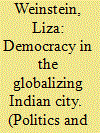

|
|
|
|
|
| Publication |
2009.
|
| Summary/Abstract |
Transformations under way in Indian cities have begun to alter the opportunities for democratic participation among the urban poor. Highlighting efforts to promote globally oriented urban developments in Mumbai, this article examines the state's engagement with groups directly impacted by these efforts. Based on ethnographic research and interviews with key stakeholders in the Dharavi Redevelopment Project (DRP), the article traces the character of such engagements over the project's four-year planning process. It finds that the state undertook an unusually inclusive process, consulting with resident and activist groups at points throughout this period. The article posits that this novel engagement is an unintended consequence of pressures to promote rapid development and ease investor concerns. Situating this case in the recent literature on political shifts in the globalizing Indian city, it concludes that the state may be engaging more with the urban poor than many of these accounts suggest.
|
|
|
|
|
|
|
|
|
|
|
|
|
|
|
|
| 18 |
ID:
188188
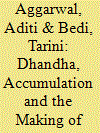

|
|
|
|
|
| Summary/Abstract |
In this paper, our main objective is to pay attention to social and material accumulations in a form of self-employed work practised by non-elites in the Indian city of Mumbai, which they call dhandha. Using ethnographic examples of two working-class, urban dhandhas—taxi-driving and vending—we suggest that thinking with the concept of dhandha and other conceptions of value and relationality that people associate with this kind of work helps us rethink and open up more abstract and universal conceptualisations of accumulation. We examine not just how much accumulation occurs but also who the various actors are in making accumulation possible; what gets accumulated and how; and why even burdensome accumulations are considered valuable and are intentionally pursued and embraced. As ethnographers who conducted our work in several of Mumbai’s many languages, we pay attention to the specific words and concepts used by our interlocutors to describe their work and their economic relations and argue that dhandha in Mumbai is not just work, it is also a way of making valuable lives and navigating the world.
|
|
|
|
|
|
|
|
|
|
|
|
|
|
|
|
| 19 |
ID:
106639
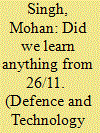

|
|
|
| 20 |
ID:
140462


|
|
|
|
|
| Summary/Abstract |
Why did Mumbai's famous dance bars have to close in 2005? This paper analyses the ban and its aftermath in terms of (1) a colonial and post-colonial genealogy of the regulation of allegedly obscene public performances in India and (2) the provocative location of the dance bars vis-à-vis the cultural politics of consumerist globalisation. Combining a reading of arguments around the ban with first-hand ethnographic vignettes, the paper is a contribution to a critical analysis of the politics of publicity in India.
|
|
|
|
|
|
|
|
|
|
|
|
|
|
|
|